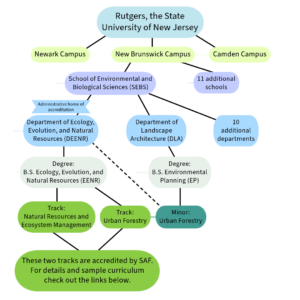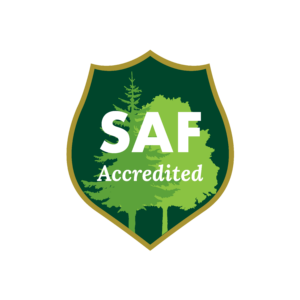Academic Program
 Urban and Community Forestry
Urban and Community Forestry
Urban and community forestry is the fastest growing segment of the forestry profession, especially in the northeast, where the total expenditure of time and money oncommunity forestry (nursery, planting, pruning, removals, and line clearance) exceeds that spent on woodlands.
Undergraduate students interested in urban forestry can pursue the Urban Forestry Track within the Ecology, Evolution, and Natural Resources (EENR) Major. The curriculum within this track is accredited by the Society of American Foresters (SAF).
The Rutgers Urban Forestry Program also is a partner in several graduate programs and post-doctoral research projects.
After Rutgers
Program Performance
Students who graduate from the Ecology, Evolution, and Natural Resources major pursue successful careers in private industry, government, and the non-profit sector. Example careers include forestry technicians, arboretum directors, park managers, utility arborists, museum specialists, natural areas technicians, ecological restoration specialists, STEM educators, GIS developers, and more.
A 2023 survey of our program graduates with 55 respondents showed that: 55% of respondents were permanently employed, 16% were employed with temporary jobs, 22% were in graduate school, 2% were unemployed, and 29% did not report employment status.
View the Graduation Report here.
Additional Information
- How do I apply to and learn more about the School of Environmental and Biological Sciences (SEBS)?
- How can I contact the program faculty?
- What are the graduation requirements for Ecology majors?
- What are the Ecology program’s learning goals for students?
- How do I report an incident involving bias?
- How do I report another kind of concern?
-

Here are sample curricula tracks for each program:
- Sample curriculum – Natural Resource and Ecosystem Management
- Sample curriculum – Urban Forestry
- Sample curriculum – Urban Forestry minor with an Environmental Planning major
-
Rutgers School of Environmental and Biological Sciences (SEBS) has earned official accreditation from the Society of American Foresters (SAF) for two tracks within its Ecology, Evolution, and Natural Resources (EENR) program. Effective January 1, 2025, the EENR Natural Resources and Ecosystem Management track and Urban Forestry track will carry SAF accreditation.
This prestigious recognition positions Rutgers as the first university in New Jersey to be accredited by the Society of American Foresters, a leading organization that sets rigorous educational standards for forestry, urban forestry and natural resource programs.
SAF programmatic accreditation is a rigorous, voluntary process which helps programs ensure they are meeting certain standards. To learn more about what SAF accreditation entails, visit the SAF website.
SAF also maintains a Code of Ethics, which our program firmly believes in and incorporates into our curriculum.

-
Urban Forestry Careers:
- Forestry Technician:
- Conduct hands-on forestry work such as forest measurements, maintenance, and tree planting.
- Consulting Forester:
- Help landowners or townships come up with forest management plans, which balance the landowner’s goals with sustainable practices.
- Urban Forester:
- Manage trees in urban spaces which come with unique challenges.
- Extension Forester:
- Work for a land-grant university, linking the scientific research and the public.
- Forest Ecologist:
- Study the ecological processes within the forests by designing experiments, collecting data, and performing data analysis.
- Arborist:
- Care for trees on an individual level, diagnosing issues, providing treatments, pruning, and removing trees.
Natural Resource & Ecosystem Careers:
- Environmental Educator
- Educates the public on environmental and ecological topics, can work for a local or national park, nature center, or similar facility.
- Environmental Specialist
- Provides specialized plant, animal, and ecosystem knowledge about a habitat to assist with restoration or habitat maintenance.
- Conservation Biologist
- Can be active in a variety of roles, governmental or non governmental organizations (NGOs) assisting with soil conservation networks, land conservation.
- Wildlife Biologist
- Studies populations of wild animals, this can be a combination of fieldwork and data analysis.
- Forestry Technician: